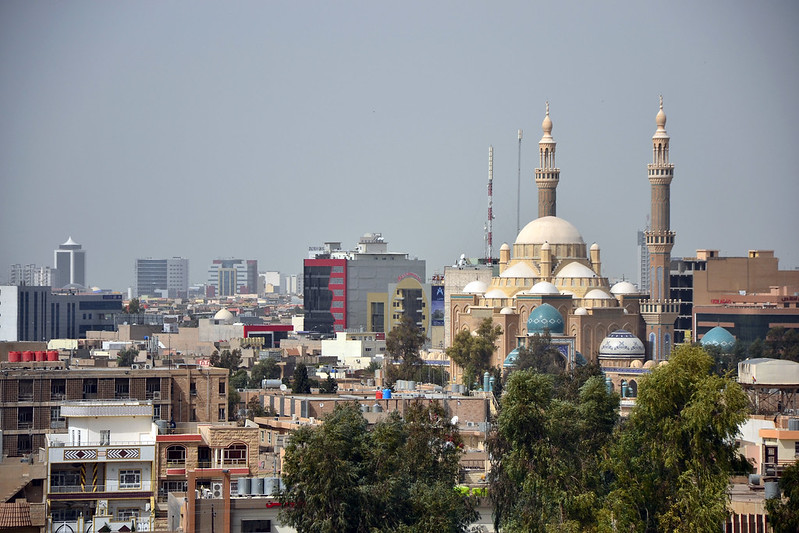Following the Taliban’s swift takeover of Afghanistan this August, Iraqi Kurdistan has insisted that it will not allow a similar fate to befall its landlocked region.
“There is a big difference between Afghanistan and Kurdistan as there is also a big difference between the Peshmerga and Afghan army,” said Kurdistan’s former President Masoud Barzani following the fall of Kabul to the Taliban.
He stressed that the “big difference” between the two cases is that Iraqi Kurdistan has a “will and a cause.”
“I want to reassure the people of the Kurdistan Region that there is a big difference in the Region’s situation with any other place,” he added.
Vice President of Iraqi Kurdistan, Jaafar Sheikh Mustafa, echoed Barzani when he also stressed that Iraqi Kurds “have a robust army of Peshmerga who, as seen by everyone, were able to confront the most vicious force on earth, which was IS [Islamic State].”
It’s not at all surprising that the Kurds would pay particularly close attention to the tragic events unfolding in Afghanistan. After all, their mountainous landlocked enclave is also located in a hostile region beset by various militias and terrorist groups. They are also allies of the United States and are undoubtedly cognizant of how their security situation could fundamentally change if Washington completely withdrew from Iraq too.
Iraqi Kurds have had this fear before. During the Iraq War (2003 – 11), their region was relatively peaceful and secure. It even prospered. Most Kurds opposed the U.S. leaving Iraq, fearing for their future security and self-rule.
These fears were not unfounded. Not long after the last U.S. troops unceremoniously left Iraq in December 2011, Iraqi President Nouri al-Maliki began saber-rattling with the Kurds over disputed regions between them, such as Kirkuk. Tense standoffs between the Iraqi Army and Kurdish Peshmerga forces ensued.
Then, in June 2014, the Islamic State (ISIS) captured Iraq’s second city Mosul and the Iraqi Army withdrew from the north of the country. Two months later, ISIS attacked Iraqi Kurdistan and subjected the Yazidi minority of the Sinjar region to a vicious campaign of genocide. The militants had even reached the outskirts of the Kurdish capital Erbil when the United States intervened with airstrikes. The Peshmerga established a 1,000 kilometre frontline against ISIS to defend their region and eventually began launching counteroffensives that pushed back the marauding militants and helped pave the way for Iraq’s liberation of Mosul. Kurdistan survived the war, but it proved highly costly for that small nation. At least 1,700 Peshmerga lost their lives, approximately 10,000 more were wounded.
The Kurds, Barzani in particular, were deeply frustrated that the U.S. did not support their independence referendum in September 2017 in light of those sacrifices. They were also angered that the U.S. did little when Iraq forcibly seized Kirkuk and most of the disputed territories from them and Iraqi Shiite militias clashed with the Peshmerga on the border the following month. Despite all this, Iraqi Kurdistan and the United States remain cordial allies to this day.
That does not, of course, mean the U.S. will stay in Iraq indefinitely. It is officially ending its combat mission there and will retain its small presence of troops who, along with military personnel from other coalition countries, are training Iraqi and Kurdish troops to combat threats like ISIS.
The Peshmerga needed substantial support during the war against ISIS. Since the Kurds don’t have an air force, they relied on U.S.-led coalition air support. The coalition also supplied them with ammunition, weaponry, and vehicles. The latter were needed at least partially because Iraqi Kurdistan is not an independent country and, therefore, cannot legally import military hardware.
The region also endured a crippling economic crisis that coincided with the war. As a result, many of the frontline Peshmerga troops didn’t receive their salaries for months on end. Despite this, morale did not collapse, with Barzani himself frequently visiting the frontlines in a show of leadership and support.
That wasn’t the case with the beleaguered and neglected Afghan Army. Those troops received scant support from their highly corrupt, incompetent, and even indifferent government. They frequently complained about the lack of food and even ammunition and concluded that fighting on was futile in the face of the imminent U.S. withdrawal. One can, therefore, hardly fault them for ultimately deciding to pack it in.
In the foreseeable future, Iraqi Kurdistan could face the threat of a resurgent ISIS – a group that never went away and is still operating from mountainous areas in the disputed territories to this day. It could even find itself in a fight against the powerful Iran-backed Iraqi Shiite militias, which have repeatedly targeted U.S. troops based in Erbil International Airport with intermittent rocket and drone attacks.
Even if the U.S. withdraws all of its troops from Iraq, which again is unlikely going to happen any time soon, that doesn’t mean Washington would withhold all means of support to Kurdistan if the region finds itself once again facing an existential threat. The 2014-17 war with ISIS demonstrated that, with U.S. air support and steadfast leadership behind the Peshmerga, morale can be sustained and the region will have a fighting chance.
In this sense, Barzani is right to reassure his compatriots that Iraqi Kurdistan will not suffer a similar fate to Afghanistan thanks to the fact that it still has a “will and a cause” worth fighting for.
Image credit: Sammy Six

